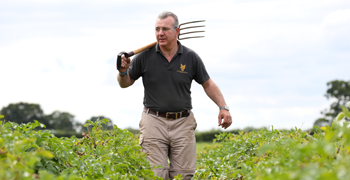One farmer that is ahead of the curve when it comes to environmental protection is Norfolk based Tim Papworth, who contract farms over approximately 1200ha of drought prone land in the north of the county.
Mr Papworth is well aware that potato production can become unsustainable if not managed properly. For this reason, he has implemented various practices on-farm to counteract this and help improve productivity as well as profitability.
“We put in green cover crops to prevent soil erosion, over-winter stubble to provide a food source for farmland birds, and carefully manage our hedgerows and woodlands to maintain habitats for wildlife. However, water conservation is currently at the top of our agenda.”

Water saving
He explains that water is an essential input and an asset that he could not farm without. “It’s a precious resource, and we do everything we can to help conserve it, especially as we operate within an environmentally sensitive area.”
However as East Anglia generally sees less rainfall than other areas of the UK, with many areas of well drained sandy soil, it’s not surprising that Mr Papworth regularly needs to irrigate his arable crops, as well as his 130ha of potatoes, that supply multiple markets.
“I normally irrigate the cereal crops in April or early May to ensure that the system is fully functioning. This avoids wasting water going forward and maintains productivity when we irrigate the potatoes to protect them from scab at tuber initiation.
“One of the steps we’re taking to minimise water wastage is changing our rain guns to irrigation booms, we’re now using them on around 50% of our crops. These are much more efficient, as water is spread evenly across the width of the boom, and is distributed close to the crop, giving a targeted application that wastes less in drift.”
Yield increases
In addition to clever irrigation management, Mr Papworth is always testing out the newest practices, varieties and products in a bid to improve his business efficiency. “I’m continually looking to improve potato yield using less water, so I hosted a field-scale trial of ICL’s wetting agent, H2Flo, as it appealed as another water-saving opportunity.”
The product increases the spread of water both vertically and laterally through the soil profile, making it more readily available to the crop, which can help to avoid drought stress in dry conditions. This therefore saves on additional irrigation costs and increases yields through improved water uptake.
“With assistance from ICL and Agrii we applied H2Flo to a block of Royal potatoes, mixed with our standard blight spray, and left an adjacent block untreated, on a well-drained sandy loam area of one of our farms near North Walsham,” he says.
Dr Richard Collins, ICL technical sales manager, explains that the trials were monitored with a moisture probe and weather station to measure rainfall and irrigation levels, as well as detect water uptake by the crop.
The data collated clearly showed that water was able to penetrate deeper into the soil treated with H2Flo and was more readily available to the plants over the growing season. But the block without the wetting agent maintained a constant moisture level with minimal plant uptake, which would decrease even further if dry conditions continued.
“The final test digs showed that the treated site yielded at a higher level than the untreated site, with an increase of 11 tonnes from 61.45 t/ha to 72.63 t/ha.
Dr Collins goes on to explain the potential for extra profit from the greater yield. “Potato prices vary, but if you work on an average price of £100/t, this extra yield would bring in an additional £1,100/ha for the farmer, which significantly outweighs the product and application costs.
Supporting trials
“On top of these benefits further testing has proven that H2Flo can reduce the amount of water applications by 25%, so saving on water and pumping costs.”
With this in mind, and the pleasing results from his own trial, Mr Papworth plans to put the product to the test again this season, trying it out on a considerably larger area with multiple varieties of potato.
“Given the significant cost to purchase and apply water, at roughly £99/hectare metre, I’m really interested to test the water saving benefits in this season’s trials.
“We use an average of 0.67 hectare metres of water in a normal year, which costs us in the region of £8,600, so any saving would be a huge benefit to us and the environment,” says Mr Papworth.
